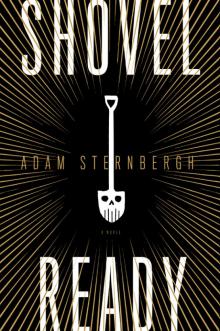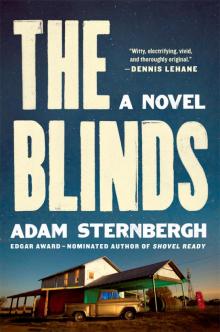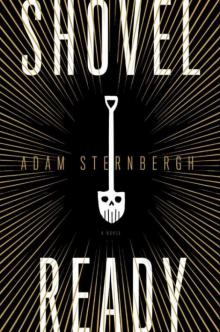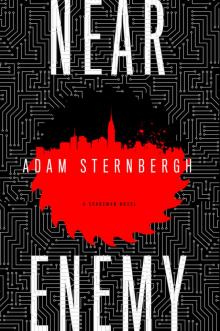- Home
- Adam Sternbergh
Near Enemy Page 14
Near Enemy Read online
Page 14
Black mouth of the park, in a permanent gape.
Swallows us all.
The first man in coveralls hustles to close the gap on Nurse on the lamplit path.
Few working lamps in the park anymore. No one wants to pay to keep them lit. So there’s no pools of light, just pools of darkness, surrounded by pools of deeper darkness.
Second man in coveralls lags behind lazily, just a backup, really, keeping an eye on things, though there’s nothing much out here to keep an eye on.
Second man no doubt starts to wonder if he even needs to be here, given it’s just one woman. Which is right about the moment when I close the gap on him.
Gloved hand clamps over his mouth.
Traps the scream in.
Hand’s gloved, so he won’t try to bite.
Like I said, some things in the universe feel simple.
Cause and consequence.
Take our second man, for example.
The one who’s now stashed in the bushes, hands clutching feebly at a throat wound that’s not going to get a chance to heal.
That’s the consequence.
Some might say the cause is a long life of bad choices and regrettable inclinations. All of which led him here, to a dark park, following an innocent woman up an empty path, within reach of my gloved hand.
I don’t see it like that, though. To me, it’s much simpler.
The cause is hidden in my hand, blade still half-extended.
With plenty more consequence to come.
First man doesn’t notice the commotion on the path behind him. Too busy closing the gap on Nurse.
She must sense him now because she starts to stride more quickly, though she isn’t running. Or screaming. Not yet.
Instead, the first man hustles and watches as she hunts around in her handbag for something. Probably searching for a handheld, he assumes.
Or maybe a whistle.
Go ahead, the first man thinks.
Let her whistle.
I figure there’s now enough ground opened up between me and the first man that my only chance is to catch him at a dead run. Second man didn’t put up much of a struggle, but I did lose a stride or two.
And the first man’s now close enough to reach out and tap Nurse on the shoulder from behind.
Her striding. Him reaching.
Finally, he reaches her.
Taps.
She spins.
He expects her to scream now, but she doesn’t.
Just smiles.
Smiles and jabs.
Turns out it’s not a whistle she was fishing for.
It’s a syringe.
That’s now buried needle-deep in the first man’s face.
Nurse thumbs the plunger calmly.
Who knows what’s in the needle, but whatever it’s full of, so is the first man now.
Some kind of wobble juice.
Man wobbles.
Drops.
The heavy kind of drop, with no effort to catch himself, so his head bounces hard on the pavement, like someone trying to crack a stubborn egg on the edge of a porcelain bowl.
Egg cracks.
Spills.
Meanwhile, I play catch-up.
When I get there, Nurse is standing over him, looking down. Then she looks at me. At my face. Then down at my box-cutter. Doesn’t seem too alarmed by either.
Nods to the box-cutter.
Don’t worry, you can put that away. What I pumped him full of? He’s not getting back up.
She looks down again at the first man, dropped in a heap, foam now edging his lips. He gives one last startling spasm, then stills. I say to her.
Nice job.
Thanks.
I take it whatever was in that needle is not as subtle as what you used on Langland and Loeb.
She looks me over again.
Smiles.
Well, look at you. You figured one thing out.
Actually, that’s two things I’ve figured out so far, if anyone’s keeping count.
25.
Nurse prods the dead man with her crepe-soled shoe.
Says to me.
Should look like natural causes. At first glance, anyway.
Nods back toward the bushes.
What about yours?
I wince.
Doesn’t look too natural.
She tosses her syringe into the underbrush. Wipes her hands down on her skirt.
Don’t worry. A couple bodies in these bushes won’t raise anybody’s eyebrows. We take care of a lot of trespassers that way.
We?
She hikes her handbag strap back up on her shoulder.
Come on. Let me take you home to meet the sisters.
The Cloisters sits like a low-slung stone fortress on a hilltop at the highest point of Fort Tryon Park. It’s got views on all sides, of the city to the south, the Bronx to the north, and the Hudson River to the west, and on the other side of the river, unspoiled New Jersey.
Unspoiled New Jersey. Sounds like an oxymoron, I know.
But the millionaire who built the Cloisters way back when also bought up all the land in Jersey on the other side of the river so no one could build anything that might sully the view.
Remains unsullied, to this day.
Might be the last thing in this city you can say that about.
As we walk toward the Cloisters, Nurse tells me the story.
Not her story. That comes later.
The story of the Cloisters.
The Cloisters, she says, used to be a museum, assembled from different medieval missions found all over Europe. All the stones were shipped over here, to America, at the behest of a millionaire. Then he bought all this land in virgin Manhattan and reassembled the monument here, at the park’s highest point, then gave the whole thing to the city as a gift. After the millionaire died, the city ran the Cloisters as a museum, stuffing it full of artifacts and knickknacks. When hard times hit, the city stripped out all the art and put the building on the market. Real estate wasn’t exactly booming, but this was an easy sale: good bones, prime location, river views. A few overseas investors sniffed around, but eventually got outbid by an anonymous consortium. Snatched up the Cloisters for a fortune, then closed it to the public. Refurbished it. Restored it. Then reopened it as a private home. Part sanctuary, part commune, part refuge, part retreat. And who was the money behind this private consortium?
I barely believe Nurse when she tells me.
Wakers.
Apparently, Wakers have money.
As Nurse is finishing the tale, I interrupt to ask her.
You mean, like those two old ladies we saw in the East Village? Who handed us that brochure?
Yes. More or less. Though those two were a little—
She hesitates, choosing her words.
—old guard.
I think of the brochure. What it said across the top. Bold letters. And how I should have paid closer attention.
AWAKE!
Say to Nurse.
You told me you’d never heard of Wakers.
She shrugs.
It seemed a little early in our relationship to discuss religion.
And those Wakers live here? In the Cloisters?
Yes.
But who would want to do that?
She smiles.
Me, for one.
We enter through a pair of enormous oaken doors under an arched stone doorway, and inside it’s cavernous and dimly lit. No more art, no more tapestries, just bare rooms and bare walls and spiral stone stairwells. Vaulted ceilings that disappear into darkness. Stained-glass windows, perfectly preserved. The only light comes from guttering candles, flickering in sconces.
And there’s nurses.
Nurses everywhere.
All women, of all ages, some look ancient, some look like girls. Some dressed in nurse uniforms, some in simple bedclothes. A woman in a white nightgown passes with a nod, then disappears behind privacy curtains, which are draped from the ceiling
like long gauzy bandages to divide up the makeshift rooms. All the furnishings are modest. Wooden stools and low-slung cots. Iron candle holders. Candles lit up everywhere.
Behind the curtains, silhouettes stir.
We pass through a great hall, our footsteps echoing.
Mine, anyway. She’s on crepe soles. I’m in steel-toe boots.
In the center of the great hall hangs a weird medieval chandelier, a giant iron wheel dangling heavy from the ceiling, ringed in candles. The candles look like little white monks, bowed in prayer, robed in wax, their heads aglow.
I ask Nurse. In a whisper.
What is this? A hospital?
Sort of.
So who are the patients?
We are.
How long have you been living here?
Since not long after I moved to New York. I was having a hard time. They found me. And helped me.
And what do you all do here?
We’re awake.
She puts her hand on my back and guides me down another hallway. Down a stairwell, into an alcove. Parts a curtain. Says to me.
This is my room.
It’s a tiny space set off from the main hall and down two or three stone steps. A towering stained-glass window lets the only light in. These must be the last stained-glass windows in New York that haven’t been busted up or broken by vandals or looters. Makes you wonder how these peaceful Wakers ward off all the ruffians.
Then I remember what Nurse said, back in the park. About the bushes full of bodies.
Nurse shows me where she sleeps. Just a cot in a cubbyhole. Side table holds a candlestick. A book lies facedown, spread-eagle like a suspect, on the bed.
Nurse picks up the book and flips through it. I’ve seen this book somewhere before. Complete Poems of Emily Dickinson. Diligently dog-eared.
Do you remember that poem I read to you? Back at the Plowman that night?
Sure. The one that sounded like an urgent telegram.
She nods. Finds the page.
Reads it again aloud.
A Death Blow is a Life blow to Some
Who till they died, did not alive become—
Who had they lived, had died but when
They died, Vitality begun.
Shuts the book.
I tell Nurse.
I still like that one.
She smiles.
I thought you would.
Sets the book aside. Points to the curtain.
Close it.
So I close it.
Then I sit down next to her on the cot. Cot groans under my weight. She leans forward. Grabs my collar. Insofar as a t-shirt has a collar.
She reels me in. Kisses me hard. Like I said.
An urgent telegram.
I pull back.
Nurse, I promised I’d get you back home. You’re back home. Now tell me what the fuck is going on.
She grins.
Promises, promises.
You didn’t find Loeb, did you? Or Langland. At least, not dead.
I found them both. After a long search. They turned out to be perfect choices.
Why?
Because hoppers like to watch them.
But what do you need with hoppers?
Nurse unpins her hat. Sets it carefully on the side table. Pulls more pins out so her hair starts to tumble. Loose strands unfurl. She helps them with a shake.
It’s not hoppers we need. It’s witnesses. People to tell the world.
Tell them what?
That the limn’s no longer safe. No longer worth the risk.
And meanwhile you’re out here sticking dreamers with needles and making sure they don’t wake up again.
That’s right.
Then let the world put two and two together. Let them think someone’s found a way to kill people in the limn.
That’s right. Just like you did.
But why?
To wake people up. People who are wasting away in the limn. There’s a beautiful world out here, if you’re awake enough to see it. Are you awake, Spademan?
Trust me. I’m plenty awake.
She grins.
That’s what everyone thinks. Until they wake up.
I stand.
And here I thought that Wakers were just a bunch of old women hanging out on street corners, handing out pamphlets.
Nurse gives her hair one last shake.
There’s been a change in leadership. Change in strategy. A younger faction that believes we need to adopt more proactive tactics.
But Nurse, if you’re out here, sticking people full of sedatives, who’s that in the limn? In the burqa?
She sighs. Stands. Takes my hand. Steps up on tiptoe. Lips inches from my ear.
Follow me.
26.
An indoor courtyard, under a stained-glass skylight, nestled deep in the center of the Cloisters.
Outside, it’s nearly dawn. Sun’s just rising, but it already feels like high noon. Morning air rolls in and licks the wilted city.
Heat wave’s coming.
Inside the courtyard, embedded in the stained-glass dome, angels and heralds hover.
Send dusty beams of colored light down to the floor.
In the beams, a single bed.
In the bed.
Me.
Nurse sits by the bed, tweaking settings. Adhering sensors to my skin. Carefully, lovingly, like she’s applying bandages to a wounded soldier sent back broken from the front.
She pauses, hand poised over my vein. Thumb on the plunger of yet another needle. Ready to slip it in. Asks me first.
You trust me?
I nod.
You sure?
I nod.
She asks why.
I give the only answer I can think of.
Why not?
She smiles. Slips the needle in.
Okay, Spademan. See you soon.
I wake up.
In a white room.
No walls.
No ceiling.
No floor.
Well, there must be a floor, because something’s holding me up.
Can’t see any floor, though. Just white. In all directions.
And in the middle of the white room.
Me.
Just me.
Just a garbageman.
Then.
Very far off.
In the distance.
A black pinprick.
A black dot.
A black speck.
A black spot.
Coming closer.
A black blot.
An ink spill.
Against white.
A black smear.
A black flicker.
A black flame.
Closer still.
A black ghost.
A black mirage.
A black dream.
A black burqa.
A woman in a black burqa.
A woman in a black burqa, standing in front of me.
Peer past the veiled screen of the burqa.
Black eyes.
Lift the veil.
Of course.
I ask Nurse.
Why so violent?
People need to be scared out of the limn.
But why a burqa? Why a bomber?
It’s what people are most scared of right now.
You couldn’t conjure up some other kind of nightmare?
Given what already goes on in there, who would ever know the difference between that and a regular dream? This is the one fear no one ever conjures in the limn. No one dares.
But if you’re out there, sticking needles in people, who’s in here?
One of the other nurses. We swap. Take turns.
And why pick on hoppers?
Because we knew they would come back and tell the world, Spademan. Spread the word. Seed fear. Hoppers gossip, after all.
And how could you be sure they’d tell people what they’d seen?
They told you, didn’t they?
N
urse stands before me in the white room in a black burqa with the veil lifted.
I look closer. Notice something. Tell her.
Your eyes are black in here.
They’re black everywhere.
I could have sworn they were green.
Look again.
Then Nurse explains the rest of it to me.
Tells me how a younger faction of Wakers decided they needed to do something radical. That the pamphlets weren’t cutting it. They needed to make a real impression.
So they decided to stop trying to argue people out of the limn, and start trying to find a way to scare them out for good. And one by one was too slow. They knew they had to start a panic. But they had few ideas and no real expertise.
Then a woman arrived one day at the Cloisters.
Knocked on the oaken door. A nurse answered.
The woman wore a black burqa, Nurse explains.
Then she tells me the rest of the story.
We never saw her face or knew her name. This was maybe a month ago. She just arrived, knocked on the door, and we welcomed her in, as we do. Everyone’s welcome here. We brewed her tea. Sat and talked. She told us she had something that we Wakers would want.
What’s that? we asked her.
An idea, she said.
She explained to us that she could teach us to break into people’s dreams, in the limn, to scare them. Explained to us how to do it. We said sure. But how do we really instigate change? There’s nothing we can do that will stop people from tapping in.
It would only take a few bodies, she said. A few people who never wake up. After that, people will start to believe the limn is no longer safe. Let hoppers spread the panic, she said. Then she laid out the rest of the plan for us. The sedatives part we already understood, of course, and we already had easy access to tappers because so many of us are nurses. I volunteered for the first one, because I believed the most.
Before she left, her teacup drained, she said, Make sure you target the hoppers. Choose people that hoppers spy on. We asked her why. Because hoppers gossip, she said. And gossip is the lethal virus, the one you need to unleash.
But how do we scare the hoppers? we asked her.
Show them what they’re most afraid of, she said.
Then she pointed to herself.
A suicide bomber. In a burqa. One who slips into your most secret dreams. Who wraps her arms around you and in her arms brings death. If it’s panic you want to instill, that’s what you’ll show them, she said.

 Shovel Ready
Shovel Ready The Blinds
The Blinds Shovel Ready: A Novel
Shovel Ready: A Novel Near Enemy
Near Enemy